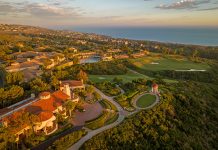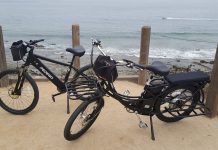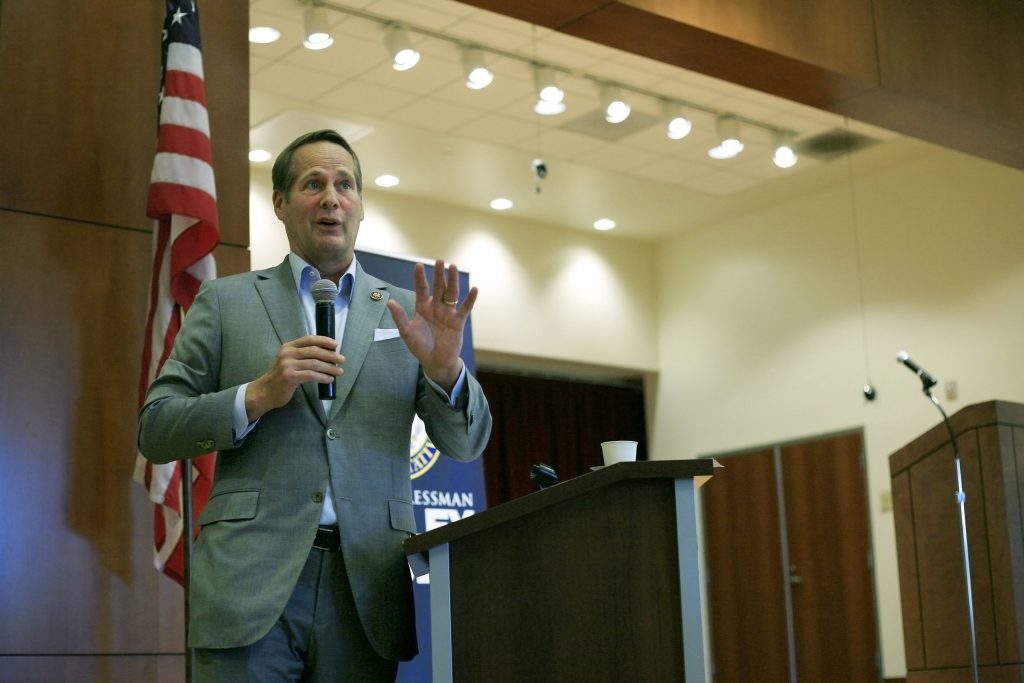
— Photo by Sara Hall ©
Rep. Harley Rouda, of Laguna Beach, chronicled his first six months serving in Congress, covered both local issues, spoke about senior citizen focused topics during two local town hall meetings recently, the first held last week in Corona del Mar and another on Tuesday in Aliso Viejo.
Rouda hosted the CdM town hall at OASIS Senior Center on Aug. 30. About 140 gathered in the Evelyn Hart Event Room to hear the congressman speak on a variety of topics, including senior fraud, healthcare, and affordable housing.
“The last thing any senior citizen should be faced with is trying to figure out how to manage their healthcare, manage the roof over their head, and making sure they have sufficient money to be able to address those two issues,” Rouda said.
Affordable housing is becoming more of an issue in Orange County, he noted. When this discussion arises, many think of people who are just entering the housing market.
“Too often senior citizens are left behind in the conversation of making sure that we have affordable housing,” Rouda commented.
Prop 13 was an important step in the right direction and needs to be maintained, he said.
“But we also have to fight back against some of the extreme behavior,” Rouda said.
For example, developers buying mobile home property, taking the competition out of the marketplace, and “jacking up rents for senior citizens,” Rouda explained.
It forces the senior residents out, and they try to decide where to move to, if anywhere is available, and how to get a roof over their head, he said. Too often the choice comes down to either “move in with a family member or, worse, be homeless.”
Rouda is also working on vouchers that allow low-income individuals, often senior citizens, to stay in their home or access other housing. The vouchers need to be better funded, he added.
They also have to work with landlords to accept the vouchers. If a citizen can’t find somewhere to accept the voucher it will expire and the person will have to go through the entire process again, Rouda explained.
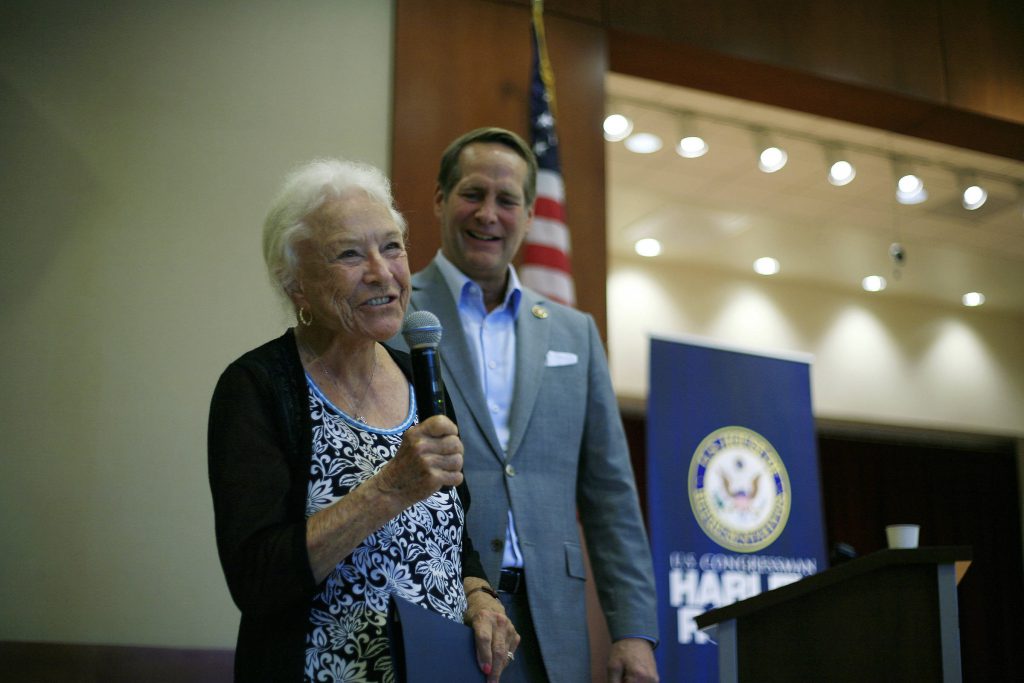
— Photo by Sara Hall ©
Simultaneously, the low-income tax credit needs to be reviewed and utilized. The federal program provides dividends in return for building senior housing communities. It essentially allows developers to build those type of residential complexes in a way that they can afford it, Rouda clarified.
“The reality is it’s expensive to build in California,” Rouda said. “A developer is going to build where they can get a return on their investment. If they can’t get a return on their investment by building senior housing here, they will go somewhere else and build senior housing or build another type of housing altogether.”
The credit program is an “economic booster” to allow developers to build low-income housing here, he explained.
“Another area we’re very focused on is continuing to fight to make sure we protect healthcare for all Americans, especially our senior citizens,” Rouda said, eliciting applause from the crowd.
There are several components, he continued.
The Affordable Care Act is “not perfect legislation, but, right now, it’s the best we have,” Rouda commented. Getting rid of the ACA would cost about 88,000 people in the district their health insurance, according to Rouda.
Giving Medicare the ability to negotiate drug prices is one way to help it improve, he suggested, prompting another big round of applause. This fight also includes that pre-existing conditions are covered, Rouda added.
“We have to address the cost of healthcare and drug prescription prices,” Rouda said.

— Photo by Darko Stojanovic/Pixabay
It’s heartbreaking to hear the personal stories of people having to decide whether to pay for food or housing or, in some cases, life-saving medication.
“We have seen utter greed take (priority) over…life-saving insulin (and other medication),” Rouda said. “That should never be the case, especially in our country.”
America spends more money on healthcare than any other developed country, Rouda pointed out, yet Americans tend to be near the bottom of the list in measuring how healthy people are compared to other developed countries.
“Part of that is because we have a very bureaucrat method that needs to be addressed,” Rouda said. “But the bigger concern, when you look at it from the individual standpoint — whether its stories of managing medicines or making choices as to keeping the lights on versus taking life-saving medicine — we know that the leading cause of personal bankruptcy is the inability to pay healthcare costs and one of the leading causes of homelessness is the inability to pay healthcare costs.”
Family caregivers also need to be considered when discussing cost of living for seniors.
In 2013, about 40 million family caregivers provided 37 billion hours of care, worth an estimated $470 billion, Rouda pointed out. A lot of these family caregivers have been pulled out of the work force in order to care for a parent or relative, he explained.
Rouda introduced H.R. 3078, Expanding Access to Retirement Savings for Caregivers Act, in June to address this issue.
“Their ability to continue making contributions to their retirement is derailed while they were put in a very critical, often emergency, situation,” Rouda said.
The goal of the bill is to amend the Internal Revenue Code of 1986 to reduce the age for making “catch-up” contributions to retirement accounts to take into account time out of the workforce to provide dependent care services.
Rouda also spoke about fighting fraud as it specifically relates to seniors.
He co-authored a comprehensive bill H.R. 3375, the Stopping Bad Robocalls Act.
The aim of the bill, which has already passed in the house, is to amend the Communications Act of 1934 to clarify the prohibitions on making robocalls, including requiring consent (with a few exceptions).
The Robocalls Act had bipartisan support in the house, Rouda noted, which he hopes will continue in the Senate.
“I have yet to run into anybody who said, ‘Gosh, I wish I could have more robocalls,’” Rouda joked.
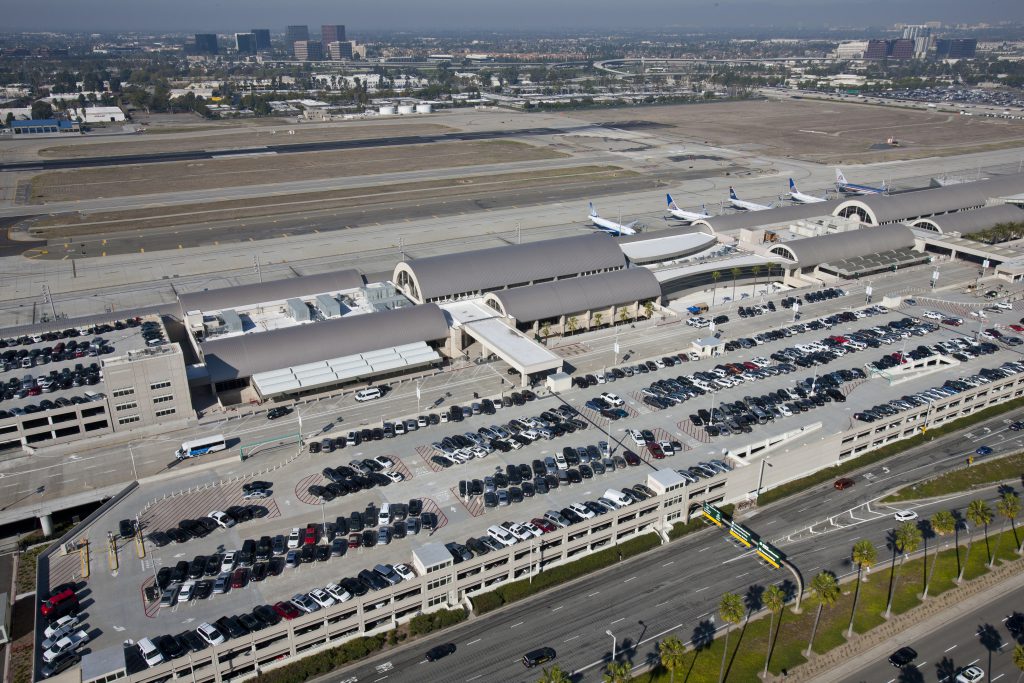
— Photo courtesy JWA/Matt Fukushima
Rouda also covered a few local topics, including John Wayne Airport and harbor dredging.
Noise and pollution from the airport is one of his top three issues for the district. They are working with the Federal Aviation Administration on the method of how to determine if the sound ordinance was violated, currently it’s based off of a 30-day average, which isn’t appropriate, he said.
Touted as the largest recreational and small-craft harbor in the world, Newport Harbor has a huge economical impact on not just the city, but all of Southern California, Rouda commented.
He understands the importance of dredging and has stepped up in an effort to acquire federal funds for the project. They are working with the Army Corps of Engineers on the project.
“I’m going to fight to make sure that we get the appropriate funds,” Rouda said.
At Tuesday’s town hall, it was standing room only as nearly 400 people gathered at the Aliso Viejo Country Club, which was a venue change from the Aliso Viejo Public Library to accommodate the larger crowd. Rouda began by summarizing his accomplishments thus far, including 28 measures introduced, 279 measures co-sponsored, 16 measures passed, and five hearings chaired.
Rouda also touted his bipartisan work, saying about 60 percent of his measures have been a result of his efforts to reach across the aisle. One such measure, H.R. 3889, or the ONDCP Technical Corrections Act of 2019, is led by Rouda and Rep. Mark Meadows (R-North Carolina) and aims to improve the federal government’s response to the nation’s opioid crisis.
Rouda spent a good portion of the night talking about environmental issues, namely, climate change and the decommissioning of the San Onofre Nuclear Generating Station (SONGS).
Within the House Committee on Oversight and Reform, Rouda chairs the Subcommittee on Environment, which he said affords him the opportunity to shine a light on environmental issues such as climate change. Rouda said one of his goals during these hearings is to work with energy companies to develop clean energy options.
Rouda also participated in a field hearing on California wildfires a couple weeks ago in Simi Valley, which he noted is tied to climate change. “We know that we have to do a better job of preparing for weather-related events and disasters and be able to react faster,” he said.
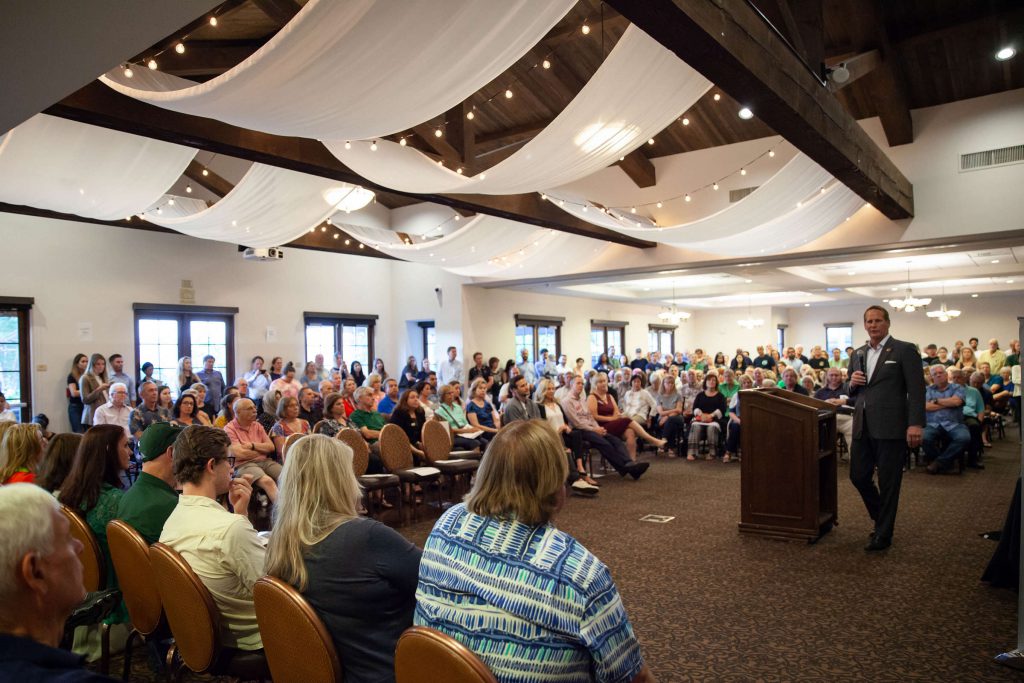
— Photo by Allison Jarrell ©
Another field hearing Rouda mentioned was on the decommissioning of SONGS.
“This is a local issue on one hand, but it’s not,” Rouda said. He noted that locally, spent nuclear fuel at SONGS is in a flood zone and an earthquake zone and an area with rising tides. But SONGS is also one of approximately 100 sites around the country where spent nuclear fuel is sitting, waiting for a long-term home.
Rouda said he is working with Rep. Mike Levin (D-San Juan Capistrano) to “find long-term national repositories for the spent nuclear fuel.”
During the Q&A portion of the town hall, one Laguna Beach resident asked what Rouda is doing specifically to coordinate moving spent fuel rods to a safer location.
“What we have to do, first of all, is identify where we can take this stuff, and I’m working on drafting legislation that would create a market-based effort to find suitable conditions,” Rouda said. “We can’t put all our eggs in one basket—what we have to do is have multiple sites bidding…There’s a point where it’s almost like a reverse auction, where if enough money is provided by the federal government, state government, then some community will say, ‘yes.’”
Rouda said once that market-based methodology creates willingness in certain communities to take in nuclear waste, it’s going to be a lengthy process to work on the logistics of moving the spent fuel to long-term repositories.
“Best case scenario, right now…you’re looking at 2029 for when we can start offloading from San Onofre,” Rouda said.
One of the most popular topics during the Q&A was gun control and reform.
“There’s a history of legislating guns to reduce violence,” Rouda said. “Justice Scalia said, in effect in a couple decisions, that the right to bear arms is not the right to bear any arms, anytime, anywhere. We the people have the right to put reasonable limits on it. There’s a reason you can’t buy a machine gun.
“Let’s not lose sight. This is an epidemic,” Rouda continued. “We are going to lose 50,000 Americans this year to gun violence—the equivalent of American lives [lost] the entire Vietnam War. This requires us to actually talk across the aisle and find common ground.”
Rouda noted that over 90 percent of Americans support national background checks.
“A lot of people on the other side say, ‘It won’t work—it won’t stop that shooting, it won’t stop this shooting over here.’ You might be right, but damn it, let’s try it,” Rouda said to applause from the crowd.
“We have a ton of gun laws, but the big issue is, we don’t have consistency from state to state,” he said later in the meeting. “If we just start with background checks and red flag laws and get empirical data to show that we’re making a difference, it’s a step in the right direction.”
For more information, visit rouda.house.gov
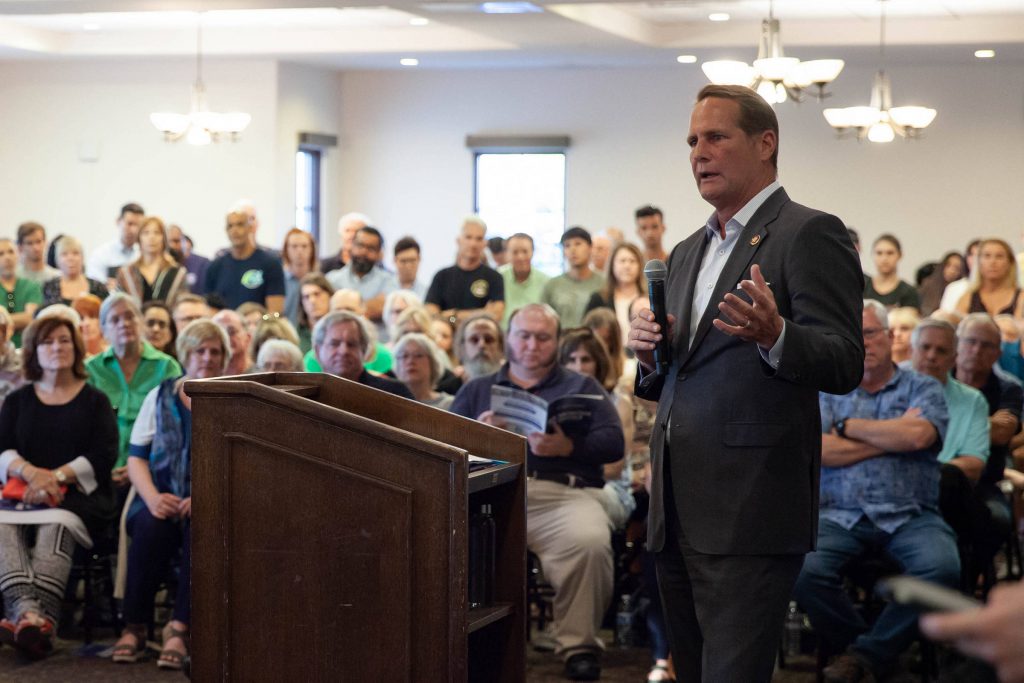
— Photo by Allison Jarrell ©



